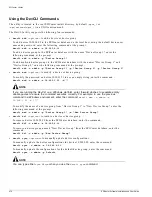
482
EPICenter Software Installation and User Guide
EPICenter Utilities
Using the FindAddr Command
The FindAddr utility is located in the EPICenter
bin
directory,
<
EPICenter_install_dir
>/bin
. By
default this is
epc4_1\bin
in Windows, or
/opt/extreme/epc4_1/bin
in a UNIX environment.
This command includes options for specifying EPICenter server access information, the address to be
located, and a search domain (an individual device and ports, or a device or port group).
The syntax of the command is as follows:
FindAddr -user
<
EPICenter username
> <
address options
> <
search domain options
> <
other
options
>
The EPICenter user name is required. You must also include at least one search address specification,
and a search domain specification.
The FindAddr command returns a list of MAC and IP addresses and the devices and ports associated
with those addresses.
Table 17 specifies the options you can use with this command:
Table 17: FindAddr command options
Option
Value
Default
-user <username>
EPICenter user name. This option is required.
None
-password <password>
EPICenter user password. If the password is blank, do not include
this argument.
No
password
-host <hostname | IP
address>
EPICenter server hostname or IP address.
localhost
-port <port>
EPICenter server port number.
Do not specify this after the -dip option or it will be taken as a search
domain specification.
80
-f <file specification>
Name of file to receive output. If you do not specify a path, the file is
placed in the current directory. If the file already exists, it is
overwritten.
Comman
d window
(stdout)
-help
Displays syntax for this command.
None
Search address options:
-all
Display all addresses located in the search
domain.
At least one of
these options is
required.
The -mac and -ip
options may be
combined.
None
-mac <mac_address>
Locate the specified MAC address. The
address must be specified as six two-digit
hexadecimal values separated by colons
(xx:xx:xx:xx:xx:xx). You can specify a wildcard
address by specifying asterisks instead of the
last three values (for example, 21:14:18:*:*:*).
This option may be repeated.
-ip <IP address>
Locate the specified IP address.
This option may be repeated.
Summary of Contents for EPICenter 4.1
Page 20: ...20 EPICenter Software Installation and User Guide Preface ...
Page 46: ...46 EPICenter Software Installation and User Guide EPICenter and Policy Manager Overview ...
Page 190: ...190 EPICenter Software Installation and User Guide Configuration Manager ...
Page 204: ...204 EPICenter Software Installation and User Guide Using the Interactive Telnet Application ...
Page 242: ...242 EPICenter Software Installation and User Guide Using the IP MAC Address Finder ...
Page 266: ...266 EPICenter Software Installation and User Guide Using ExtremeView ...
Page 284: ...284 EPICenter Software Installation and User Guide Real Time Statistics ...
Page 436: ...436 EPICenter Software Installation and User Guide Using the Policy Manager ...
Page 454: ...454 EPICenter Software Installation and User Guide The ACL Viewer ...
Page 468: ...468 EPICenter Software Installation and User Guide Troubleshooting ...
Page 504: ...504 EPICenter Software Installation and User Guide EPICenter External Access Protocol ...
Page 510: ...510 EPICenter Software Installation and User Guide EPICenter Database Views ...
Page 522: ...522 EPICenter Software Installation and User Guide EPICenter Backup ...
Page 526: ...526 EPICenter Software Installation and User Guide Dynamic Link Context System DLCS ...
Page 546: ......






























